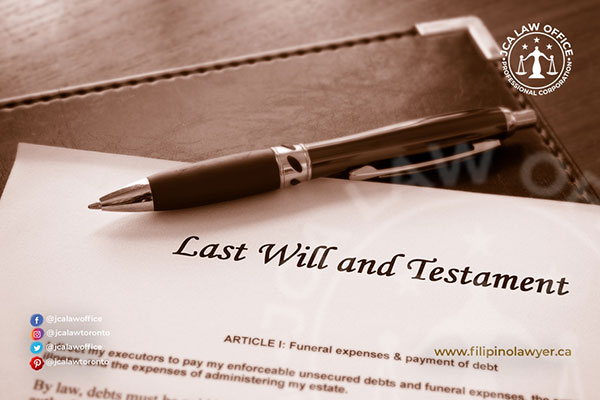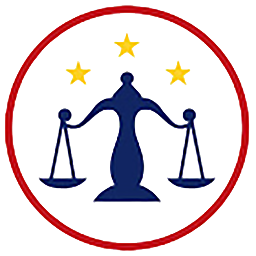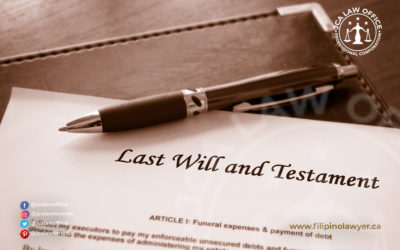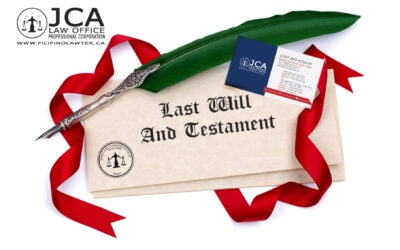Having The Will To Make A Will
Sometimes it just happens – you wake up one morning thinking about your “What ifs”.. maybe that nagging feeling was triggered by hearing about the untimely death of someone famous such as Kobe Bryant. Or maybe you had trouble sleeping last night, getting worried about coronavirus. Or perhaps you felt some chest pains early this morning and hoping it’s not a sign of a heart attack, that it’s just heartburn from the steak and wine you consumed after availing a “winterlicious dinner” from one of Toronto’s fine dining restaurants. Or maybe you had that major disagreement with your partner the other day with regards to his screen time and not helping you with chores, feeling your stress levels go up, afraid it might lead to cardiac arrest. Whatever the reason may be, you can’t help but think what might happen to your kids, or your properties (if you’re one of the lucky people to have one), or your financials in case something unfortunate happens to you. If that is the case, then perhaps it’s about time you sit down and think about making your own will.

What is a will?
What is a will anyway? And how is it different from other legal documents such as power of attorney (POA)? A will is a legal document that states how your assets will be distributed after your death. As defined by the Ontario Ministry of the Attorney General, “(a) person’s will is a written document that sets out the person’s wishes about how his or her estate should be taken care of and distributed after death. It takes effect when the person dies.” To make it sound more official, a “last will and testament” allows you to have your say after you have passed away. It has no powers whatsoever when you are alive. The legal document that is binding while you are still alive is the power of attorney, sometimes also referred to as the “living will”.
RELATED TOPIC:
https://filipinolawyer.ca/everything-you-need-to-know-about-power-of-attorney-poa/
Therefore, the two keywords that you need to remember to differentiate these two documents:
POA – alive, Will – dead.
Who are the main characters in a will?
1. Beneficiaries
The lucky people who will be named in the distribution of your assets are called “beneficiaries”. The items going to the beneficiaries are called “bequests”. Everything that you own – your jewelry, your collection of bags, your house, your insurance, your cat and all other assets that you may have is called your “estate”. A bequest can be a sum of money such as “$50,000 to my nephew John”, or an object – “my collection of Hermes bags goes to my granddaughter Ann”, or a percentage of your estate – “30% of my estate goes to my son Adam”. You can be this specific or you can make your executor’s life less complicated by simply dividing your estate equally – “my entire estate to be divided equally between my son and 3 daughters”.
The distribution of your assets is basically made up of a plan, but you should also have a plan B in your will in case your main plan cannot be executed for whatever reason. Usually, your will should say something like, “leave my entire estate to my husband, Joe, if he survives me. If my husband Joe dies first and does not survive me, then divide my entire estate into equal shares between all of my 3 children”. Your will should be written in such a way that no matter what happens in the future, there is a plan for your estate.
2. Executor of Will
This is the person you assign to carry out the instructions in your will. You can choose your best friend (and hope that he/she will live longer than you) or a close family member to take on this role, but keep in mind that this person must be trustworthy, reliable and has the patience to work with your beneficiaries (presuming you do not want any drama right after you die). They are also the ones responsible to arrange your funeral, gather and secure your assets, and distribute them to your beneficiaries according to the instructions in your will. You may hire a law firm or a lawyer if you feel that you do not have a trusted friend or relative who can take on this responsibility.
3. Guardians for your Children
This may sound so cynical and morbid, but if your spouse will also be unavailable for your minor children, (for instance, both you and your spouse were involved in a car accident and no one survived), or if you are a single parent, then you need to assign somebody to take care of your children. In reality, what happens is that if neither parent is available, then a judge at the family courts will appoint a guardian. Hopefully, a concerned relative or friend will come forward and offer themselves as the guardian and the judge will grant guardianship to the family member or person that you consider to be the best person to look after your kids. As a parent, you can ensure that by making a will, you may appoint someone to be your kids’ guardian, and this would be the over-riding factor in the judge’s decision, together with any appointment made in the child’s other parent’s will. If this person is still willing and able to serve as the guardian at the time of an unfortunate incident, then the judge would most likely grant guardianship to him/her.

What will happen if you die and you do not have a will?
Death may happen when you least expect it. It’s a sad reality that we need to keep in mind. When you die without a will, you are said to die “intestate”. This means that the Succession Law Reform Act in Ontario sets out how the estate is distributed, which unfortunately may cause more problems, delays and additional unnecessary costs to your family or relatives.
So, when is the best time to make a last will?
In all honesty, there is no “right time” to create a last will. Thinking about your future death or illness and making all these tedious appointments and asset distribution is no fun. But not having one is worse. The people you care about the most will have to face more difficulties and challenges in the future if that happens. Studies show that the majority of Canadian adults (< 55%) do not have signed & legal wills. Based on the study, the reason why Canadians do not have one is because: (1) they do not know how to get started, (2) they believe they are too young to have one, and (3) they think they do not have enough properties or finances to distribute anyway. If you are one of those people, then it’s about time you act and do something about it before it’s too late.
JCA LAW OFFICE is having a Couple Wills package promo every 2nd Friday of the month beginning February 14th. To find out more, you may visit our office at 168B Eglinton Ave. East, Toronto, ON M4P 1A6 (street level), just a few steps away from the building where the Philippine Consulate Toronto is leasing. You may also give us a call at: 1-855-522-5290 to book your appointment.
Last Will & Testament Blogs
Recent Blogs
Complete Guide to the Process of Extrajudicial Settlement of Estate in the Philippines
Disclaimer: This article is not intended to provide any legal advice. If you need legal advice, consult with a legal professional such as a lawyer...
Wills And Powers of Attorney Promo
You may visit our office at 168B Eglinton Ave. East, Toronto, ON M4P 1A6 (street-level), just several steps away from the building where the...
Why last will, power of attorney for property & personal care and health care directive (living will) matters?
Why last will, power of attorney for property & personal care and health care directive (living will) matters? By Gin Aguilar It can be the...
Follow us on our Social Media accounts:
Facebook:@JCALawOffice
Instagram:@jcalawoffice
Twitter:@JCALawOffice
REFERENCE:
Last Will & Testament Service
Book a Last Will Appointment Today!
Reach out to our team to discuss your Last Will, and let’s build a secure future for your loved ones.



